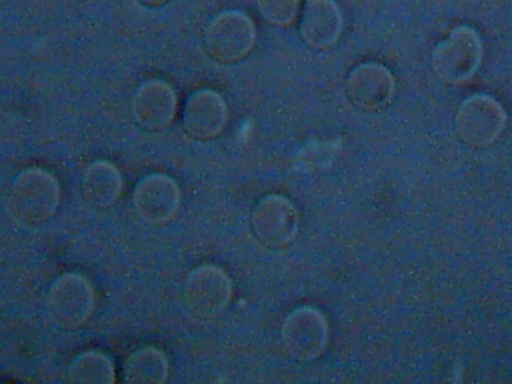|
|
|
COLORADO HEPA
BIOLOGICALS CONFIRMED
Clifford E Carnicom
Mar 16 2001
A second HEPA (High Efficiency Particulate Air) filter sample has now been analzyed under the microscope. This filter was received from Aspen, Colorado, a high altitude region. This filter was exposed to the outside atmosphere for a duration of five days at approximately 15 feet above ground level. This HEPA filter also clearly shows the frequent presence of biological materials. Again, the best visual analysis available at this time indicates that these cellular materials appear to be erythrocytes (red blood cells). This is indicated by the uniformity, the color, the size and the bi-concave nature of the cells. The sizes of the cells again measure at approximately 5 microns in diameter. Encapsulating or binding materials again surround the majority of the cells that are found. The results of this analysis are completely and exactly identical with the first HEPA filter analysis and the electrostatic precipitation results from Santa Fe, New Mexico. This latest review is now the 4th atmospheric sample that has been analyzed under the microscope, and the results are identical for each. Two earlier airbone samples of fibrous samples, as have been received the EPA without acknowledgement, also show the presence of similiar biological components.
These results again demonstrate the urgent need for independent, professional and verifiable biological identification and medical analysis of the samples which are being disclosed.
Biologicals Identified within HEPA Filter Cartridge
Note Concavities Visible
Exposure Time : 5 days
Magnification : Approx. 2000x
The only sufficient resolution to the questions raised is that of testing and positive identification. Discourse is insufficient.
The visibility of the binding or base material, and consequently the cells by the process of contrast, appears to be significantly enhanced with the use of an iodine stain. A dessication, or freeze-drying process remains a viable consideration because of the reduced size (note earlier studies), as well as the consideration of alternative species. Any corrections to these findings will be presented as they are appropriate.
It is urgent that the sampling process now be extended across the entire nation. Two locations within the U.S. separated by approximately 250 miles straight line distance are showing identical results. The methods and equipment for HEPA filtering are relatively inexpensive and accessible, and are described on a previous page. It is requested that such samples be sent for professional, independent and verifiable analysis, and the results disclosed to the public for review. Citizens are free to contact me with sample filters if they have no other resources available to them.
Clifford E Carnicom
Mar 16 2001
Biologicals Identified within HEPA Filter Cartridge
Note Concavity Visible Within Lower Cell
Exposure Time : 5 days
Magnification : Approx. 2000x
Biologicals Identified within HEPA Filter Cartridge
Exposure Time : 5 days
Magnification : Approx. 2000x

CONTROL ANALYSIS : Human Blood Cells - Bi-concavities Visible
Magnification : Approx. 2000x - Estimated Size : 7 microns
Edited Mar 22 2001